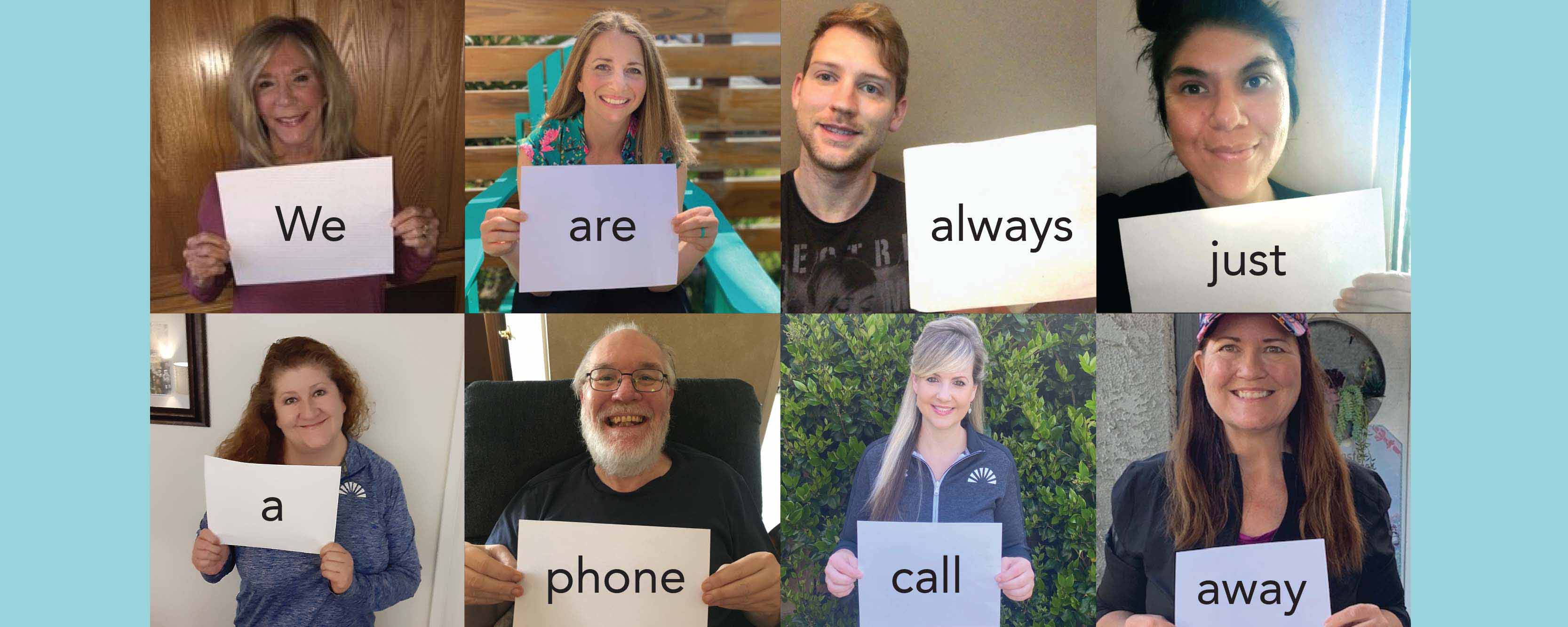Beach Cities Health District’s Community Services department doesn’t have an official tagline, but if it did, that altruistic mantra would be an appropriate contender.
This team of helping professionals serves as the community’s health safety net for Beach Cities residents of all ages. In the era of COVID-19, the support provided to the community has been exponentially increased as employees of BCHD’s temporarily shuttered fitness centers have been redeployed to support the call line, virtually working alongside the Community Services team to provide essential information, referrals and errand support. Call volume has increased by 100%, as vulnerable Beach Cities residents seek help while Safer At Home. The month of May is both Mental Health Awareness Month and National Older Adult Month, so it’s especially timely to reflect on how the most vulnerable in our community are being supported.
“When I started at Beach Cities Health District more than three years ago, I learned about how big of an impact the care management program was making on the health and well-being of the older adults in our community,” said Tom Bakaly, Chief Executive Officer. “I thought it was the best kept secret at BCHD, and I want more people to know that we're here to offer these safety net services and personalized referrals. And not just for older adults – for every Beach Cities resident."
Before COVID-19, a typical day for a BCHD Care Manager may have included several in-home visits to an older adult or adult with living with disabilities to conduct a free biopsychosocial assessment – which is social work speak for a deep-dive into the individual’s health, well-being and support system. This process helps assess if the individual has the physical, mental and social health support to age in place, independently, in their home for as long as safely possible. This includes a peek in the fridge – do they have food and essential supplies? A check of the bathroom – do they need a shower chair or safety rails? And a sit-down to discuss their support system, their short- and long-term health concerns and goals, a screening for memory impairment and depression, and discussions about difficult but essential topics including end-of-life planning. Now, this assessment is happening virtually, through a thorough telephonic assessment.
From there, the plan of care is formulated, and additional support is implemented. If the client has family members or loved ones they rely on for support, they are consulted regarding the assistance the client might need. If the client qualifies financially and needs health-related support services in the home, BCHD will subsidize services through their contracted vendors. Safety is paramount, and these licensed agencies are following strict health and hygiene protocols including wearing Personal Protective Equipment during this pandemic. Clients may receive support such as bathing, meal preparation, light housekeeping and socialization from non-medical home care agencies. If the client has fallen recently, BCHD will work to get them connected with an emergency response system and help provide them an alert pendant. If they need home medical products or supportive supplies, BCHD can have them shipped directly to their home. If there are issues navigating health insurance and the healthcare system, then BCHD is able to help them advocate for and access coverage. Clients may also be paired with one of BCHD’s volunteers for socialization, errand support or home exercise.
“We know the population we are serving is vulnerable, and their overall health, wellbeing and safety are our top priorities,” said Melissa Andrizzi-Sobel, director of community services at BCHD. “For some of our clients, this might be the only phone call they receive all week. Our team supports their physical health, but also provide social and emotional support throughout the year. Now, during this time of uncertainty and physical distancing, it’s even more important and critical.”
Recognizing the social disconnectedness and increased isolation that older adults might be experiencing, BCHD's older adult program volunteers – who typically provide social connection as conversation companions, brain buddies, errand assistance and exercise companions – have also converted their support to virtual, making calls each week to check on the physical and emotional health of their clients. Additional BCHD staff have been reassigned during COVID-19 and deployed to help support errand assistance, picking up groceries, prescriptions and other supplies.
“We know this is a challenging time for all Beach Cities residents, and we wanted to make sure we’re still able to provide that safety net for our current clients and those impacted by COVID-19,” said Bakaly. “Providing support for older adults is one of our top priorities, and it will continue to be as we move into the recovery phase.”
With this high-touch, client-focused work now being conducted virtually, the more than 430 residents on BCHD’s caseload are receiving more frequent check-ins from their care manager, who is also collaborating with their loved ones, neighbors and health care providers to support their overall health.
“If there’s a way to provide support that will ultimately improve someone’s quality of life, we’re here to do it,” said Andrizzi-Sobel.
This extra support hasn’t gone unnoticed.
“My groceries were delivered by a delightful young man, who picked out the best-looking fruits and vegetables,” said one Beach Cities resident who requested errand assistance. “Talking with my care manager made my day, and my delivery made it even better. It was just perfect.”
Continue Reading the Blog Series | Other Ways to Help | Meet BCHD's Community Services Team




